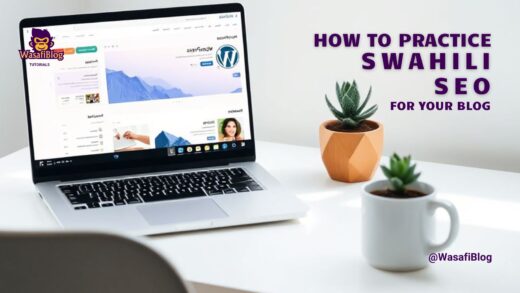Have you ever searched for something in Swahili online and found the results lacking? Or maybe you have a passion—for cooking, farming, technology, or storytelling—that you know would resonate with a Swahili-speaking audience? If so, you’re in the right place. I’m here to tell you that starting a successful Swahili blog is not only possible but is one of the most exciting opportunities online right now.
For the last three years, my world has revolved around two things: writing and learning. I’ve dedicated myself to transforming a simple hobby into a professional skill, diving deep into blogging, content creation, and the sometimes-mysterious art of Search Engine Optimization (SEO). Most of my work has been in English, navigating a crowded space to find my voice and build an audience.
But lately, something has been pulling at me. I see a vibrant, growing, and hugely underserved digital landscape: the Swahili-speaking audience. And while I’ve built my career in English, it brings me immense joy to share what I’ve learned to help you start a blog in Swahili.
So, this is for you. For the aspiring writer in Dar es Salaam, the entrepreneur in Nairobi, the creative in Mombasa, or the diaspora in London wanting to connect with home. This is your guide to starting a Swahili blog and turning it into a source of income.

How To Start a Blog and Make Money in 2025
Let me be clear from the start: this isn’t a “get rich quick” scheme. This is a journey of patience, learning, and consistency. It’s a self-taught skill that you adapt and grow with over time. But the opportunity? It’s immense.
Why a Swahili Blog? Isn’t English Better?
This is a question I get a lot. Yes, the English-speaking internet is massive, but it’s also incredibly competitive. Imagine trying to open a small coffee shop on a street already packed with Starbucks and Costa Coffee. It’s tough.
Now, imagine that same coffee shop on a bustling street with very few cafes. That’s the Swahili internet right now.
- Less Competition, More Opportunity: There are millions of Swahili speakers online, actively searching for information, entertainment, and solutions in their native language. From “jinsi ya kupika pilau la ng’ombe” (how to cook beef pilau) to “maoni ya simu za Tecno” (reviews of Tecno phones), the demand is there, but the supply of high-quality content is still growing.
- Authentic Connection: When you write in Swahili, you’re not just sharing information; you’re connecting on a cultural level. You understand the nuances, the humour, and the local context in a way that translated content never can. This builds a fiercely loyal audience.
- A Growing Digital Economy: East Africa’s digital economy is booming. More people are online, more businesses are advertising, and e-commerce is becoming the norm. By establishing your blog now, you are positioning yourself at the forefront of this growth.
My Simple, 4-Step Blueprint to Start a Swahili Blog
This is the exact process I followed. No fluff, just the essentials.
Step 1: Finding Your “Niche” – What Will You Write About?
Before you buy a domain name or even think about a logo, you need to answer one question: What will my Swahili blog be about? This is your niche. The golden rule is to choose something you are either passionate about, knowledgeable in, or both.
Don’t just say “I’ll write about life.” That’s too broad. Get specific. Here are some ideas that have huge potential in the Swahili space:
- Mapishi (Recipes & Food): Share traditional recipes, modern cooking tips, or review local restaurants.
- Kilimo cha Kisasa (Modern Farming): A massive topic. You could focus on poultry, hydroponics, or organic farming for small-scale farmers.
- Urembo na Mitindo (Beauty & Fashion): Review locally available beauty products, showcase African fashion trends, or offer makeup tutorials.
- Teknolojia (Technology): Unbox and review smartphones and gadgets that are popular in the East African market. Explain complex tech in simple Swahili.
- Ujasiriamali na Biashara Ndogo (Entrepreneurship & Small Business): Guide people on how to start a business, manage finances (
usimamizi wa fedha), or market their products online. - Malezi na Familia (Parenting & Family): A topic that never gets old. Share parenting advice from a local, cultural perspective.
Choose one area and own it. Become the go-to person for that topic.
Step 2: The Technical Bits (Made Simple)
Don’t let the technical side scare you. After three years, I can tell you it’s much easier than it looks.
- Domain Name (Jina la Blogu): This is your blog’s address (e.g.,
mapishiyetu.co.ke). Keep it short, memorable, and related to your niche. You can use domains like.co.tz,.co.ke,.ug, or the universal.com. - Hosting (Sehemu ya Kuhifadhi): This is the “land” where your “house” (the blog) will sit. It’s a server where all your files are stored. Companies like Hostpinnar (Kenya), Bluehost, or Hostinger are great starting points. A basic plan is all you need to begin.
- Platform (Mfumo wa Blogu): Use WordPress.org. I can’t stress this enough. It’s the industry standard for a reason. It’s free, powerful, and gives you complete control to customize and, most importantly, monetize your blog however you want. Most hosting providers offer a simple one-click installation for WordPress.
Step 3: Creating Content & Learning Basic Swahili SEO
This is where the real work—and the fun—begins. Your content is the heart of your blog. But just writing isn’t enough; you need people to find it. This is where Swahili SEO comes in.
SEO sounds complicated, but the basics are simple. It’s about signaling to Google what your content is about so it can show it to the right people.
- Keyword Research (Utafiti wa Maneno Muhimu): Before you write, think: “What would someone type into Google to find this information?” That phrase is your keyword.
- Example: Instead of a title like “My Pilau,” use “Jinsi ya Kupika Pilau Laini na Tamu” (How to Cook a Soft and Delicious Pilau).
- Free Tool: Just use Google! Type in a search term and look at the “People also ask” section and the “Related searches” at the bottom of the page. These are the exact things people are looking for.
- Write for Humans, Optimize for Google: Your primary audience is your reader. Write in a natural, engaging, and clear Swahili. Then, make sure your main keyword appears in:
- Your post title (the H1).
- At least one subheading (H2).
- The first paragraph of your article.
- A few times throughout the text, naturally.
- Consistency is King: You don’t have to post every day. But creating a schedule—maybe one or two high-quality posts per week—and sticking to it tells Google that your blog is active and tells your readers when to expect new content.
Step 4: The Path to Making Money (Tunaingia Kwenye Pesa)
This is the part everyone is waiting for, but it’s the last step for a reason. You need an audience first. It might take 6 months, a year, or even more of consistent work before you see significant income. But it will come.
Here are the most common ways to monetize a Swahili blog:
- Google AdSense: This is the easiest way to start. Google places ads on your website, and you get paid when people see or click on them. You need a decent amount of traffic and high-quality content to be approved.
- Affiliate Marketing (Uuzaji wa Ushirika): This is my personal favourite. You recommend a product or service, and when someone buys it through your unique link, you earn a commission.
- Example: A tech blogger in Tanzania could partner with Jumia. They write a review of a new Samsung phone and include an affiliate link to the phone on Jumia’s website. For every sale made through that link, they earn a percentage.
- Selling Your Own Products (Kuuza Bidhaa Zako): This is where the real money is made long-term. Once you’re an authority in your niche, you can sell:
- E-books: A food blogger could sell a PDF e-book of “Mapishi 50 ya Sherehe” (50 Holiday Recipes).
- Services: A business blogger could offer consulting services (
ushauri wa kibiashara). - Online Courses: A farming expert could create a simple video course on setting up a chicken coop.
- Sponsored Posts (Machapisho ya Wadhamini): As your audience grows, brands will pay you to write about their products. For example, a local bank might pay you to write an article about the best savings accounts for young entrepreneurs.
My Final Word: Anza Leo (Start Today)
For the first year, I barely made enough to buy a cup of coffee. But I kept learning, kept writing, and kept serving my audience. Now, it’s a steady, reliable source of income. It’s an asset I built myself, one blog post at a time.
You can do the same. The Swahili digital space is a beautiful, open field waiting for your voice, your expertise, and your stories. There’s a genuine hunger for quality content in Swahili. People are searching for everything from “jinsi ya kupika pilau la ng’ombe” (how to cook beef pilau) to “ushauri wa biashara ndogo ndogo” (small business advice).
Don’t wait until you’re a “perfect” writer. Don’t wait until you understand every single thing about SEO.
Frequently Asked Questions (FAQ)
Q: How much does it cost to start a Swahili blog? A: You can start for free on platforms like Blogger. However, for a professional setup (domain + hosting), expect to invest around $50 – $100 (or the equivalent in your local currency) for the first year. It’s a small investment for your own online business.
Q: Do I need to be a perfect writer? A: Absolutely not! Clarity and passion are more important than perfect grammar. Write like you speak. Your authentic voice will connect with readers far more than overly formal language.
Q: How long does it take to make money? A: Be patient. It typically takes 6 months to a year of consistent effort before you start seeing any meaningful income. Focus on building your audience first; the money will follow.
Q: Can I really find enough advertisers for a Swahili blog? A: Yes! Google AdSense works globally. Furthermore, as your traffic grows, you’ll be surprised by how many local and regional businesses are looking for ways to reach a Swahili-speaking audience.
I’d love to hear from you. Leave a comment below with one niche idea you have for a Swahili blog. Let’s brainstorm together!





